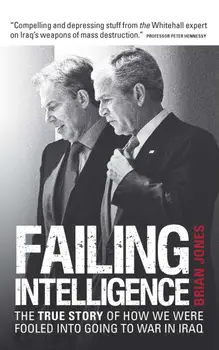This is the first book on Iraq by a British intelligence official involved in the process that led to Britain taking part in the 2003 invasion. As the former head of the UK Defence Intelligence Staff's nuclear, biological and chemical section, Brian Jones is ideally placed to pronounce upon the way in which Britain was taken to war and the way in which the intelligence reporting on Iraq's weapons of mass destruction (WMD) was manipulated to justify Saddam Hussein's removal from power. Jones calls on his own experience and knowledge, a variety of leaked documents, and the expert testimony given to a series of inquiries, including the current Chilcot inquiry, to examine how and why Tony Blair and George W. Bush, managed to deceive their legislatures and their electorates into believing that Iraqi WMD was a real threat that could attack the West within 45 minutes. He describes how Blair and Bush sought to use subsequent inquiries to cover up their own culpability in the deception, in order to facilitate re-election and keep their jobs. In conclusion, Jones pulls together the lessons that should have been learned in relation to both the use of intelligence to justify policy-making and with regard to broader international issues of security and governance.
Failing Intelligence : How Blair Led Us into War in Iraq
Aloita tämä kirja jo tänään, hintaan 0€
- Kokeilujakson aikana käytössäsi on kaikki sovelluksen kirjat
- Ei sitoumusta, voit perua milloin vain
Kirjailija:
Kieli:
englanti
Muoto:
Mathematical Optimization
Fouad Sabry
bookIn Strange Company : An American Soldier with Multinational Forces in the Middle East and Iraq
Col. Roland J. Tiso Jr. (Ret) US Army
audiobookCompassionate Conservatism : What It Is, What It Does, and How It Can Transform America
Marvin Olasky
bookImpossible Victory : How Iraq Defeated ISIS
Haider al-Abadi
bookMoral Imperative
Darrel D. Whitcomb
audiobookDivided by Terror
John Bodnar
audiobookOut of Iraq : A Practical Plan for Withdrawal Now
George McGovern, William R. Polk
bookWhy Read : Selected Writings 2001-2021
Will Self
audiobookbookNordic Narratives of the Second World War: National Historiographies Revisited
bookThe Romance of Mathematics
P. H. Ditchfield
bookBurning Horizon
Julian Whippy
audiobookThe Fall of the House of Bush: The Untold Story of How a Band of True Believers Seized the Executive Branch, Started the Iraq War, and Still Imperils America's Future
Craig Unger
audiobook














